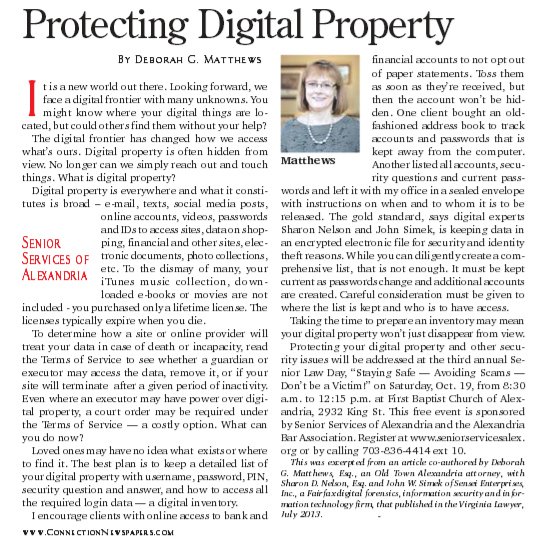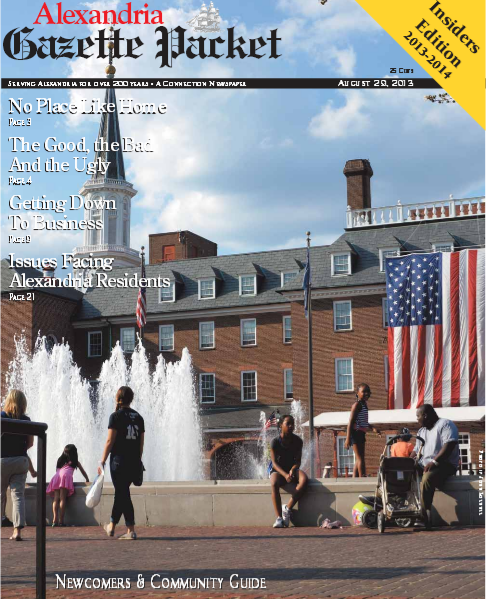Many of us have digital property. Family and vacation photos stored in the cloud for safekeeping and ease of sharing. Music, books, and movies. Email with friends and family as well as business matters. Financial assets and records.
We like our digital property – it is easy to use and we can access it from most anywhere. Yes, it often isn’t easy to locate since it isn’t kept on a shelf or in a drawer. Making an inventory and writing down passwords is important.

Protecting Digital Property
By Deborah G. Matthews
It is a new world out there. Looking forward, we face a digital frontier with many unknowns. You might know where your digital things are located, but could others find them without your help?

Alexandria-08-28-2013
The digital frontier has changed how we access what’s ours. Digital property is often hidden from view. No longer can we simply reach out and touch things. What is digital property?
Digital property is everywhere and what it constitutes is broad – e-mail, texts, social media posts, online accounts, videos, passwords and IDs to access sites, data on shopping, financial and other sites, electronic documents, photo collections, etc. To the dismay of many, your iTunes music collection, downloaded e-books or movies are not included – you purchased only a lifetime license. The licenses typically expire when you die.
To determine how a site or online provider will treat your data in case of death or incapacity, read the Terms of Service to see whether a guardian or executor may access the data, remove it, or if your site will terminate after a given period of inactivity. Even where an executor may have power over digital property, a court order may be required under the Terms of Service — a costly option. What can you do now?
Loved ones may have no idea what exists or where to find it. The best plan is to keep a detailed list of your digital property with username, password, PIN, security question and answer, and how to access all the required login data — a digital inventory.
I encourage clients with online access to bank and financial accounts to not opt out of paper statements. Toss them as soon as they’re received, but then the account won’t be hidden. One client bought an old-fashioned address book to track accounts and passwords that is kept away from the computer. Another listed all accounts, security questions and current passwords and left it with my office in a sealed envelope with instructions on when and to whom it is to be released. The gold standard, says digital experts Sharon Nelson and John Simek, is keeping data in an encrypted electronic file for security and identity theft reasons. While you can diligently create a comprehensive list, that is not enough. It must be kept current as passwords change and additional accounts are created. Careful consideration must be given to where the list is kept and who is to have access.

Taking the time to prepare an inventory may mean your digital property won’t just disappear from view. Protecting your digital property and other security issues will be addressed at the third annual Senior Law Day, “Staying Safe — Avoiding Scams — Don’t be a Victim!” on Saturday, Oct. 19, from 8:30 a.m. to 12:15 p.m. at First Baptist Church of Alexandria, 2932 King St. This free event is sponsored by Senior Services of Alexandria and the Alexandria Bar Association. Register at www.seniorservicesalex.org or by calling 703-836-4414 ext 10.

